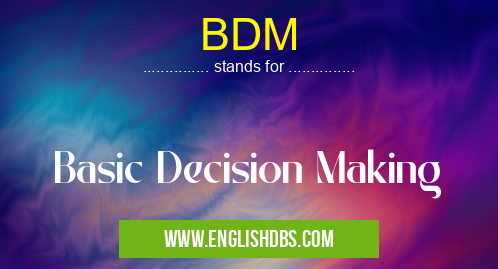What does BDM mean in UNCLASSIFIED
BDM stands for Basic Decision-Making, a fundamental cognitive process involving the selection of an action or course of action from a set of available options. It encompasses various aspects of decision-making, including problem identification, gathering information, evaluating alternatives, and making a choice.

BDM meaning in Unclassified in Miscellaneous
BDM mostly used in an acronym Unclassified in Category Miscellaneous that means Basic Decision Making
Shorthand: BDM,
Full Form: Basic Decision Making
For more information of "Basic Decision Making", see the section below.
Steps in Basic Decision-Making
The basic decision-making process typically involves the following steps:
- Identify the Problem: Clearly define the issue or problem that requires a decision.
- Gather Information: Collect relevant data and information to gain a comprehensive understanding of the situation.
- Generate Alternatives: Brainstorm and develop a range of possible solutions or alternatives.
- Evaluate Alternatives: Analyze each alternative based on its potential benefits, risks, and consequences.
- Make a Choice: Select the most appropriate alternative based on the evaluation.
Types of Basic Decision-Making
There are various types of basic decision-making, including:
- Programmed Decisions: Routine decisions that follow established procedures or guidelines.
- Non-Programmed Decisions: Unique or complex decisions that require creative thinking and judgment.
- Strategic Decisions: High-level decisions that affect the overall direction and goals of an organization.
- Tactical Decisions: Decisions that guide daily operations and implement strategic plans.
Factors Influencing Basic Decision-Making
Several factors can influence basic decision-making, such as:
- Individual Psychology: Cognitive abilities, personality traits, and biases can impact how individuals make decisions.
- Organizational Culture: The values, norms, and expectations within an organization can shape decision-making processes.
- Time Constraints: The urgency or scarcity of time can influence the depth and thoroughness of decision-making.
- Risk Tolerance: Individuals' willingness to accept uncertainty and potential negative outcomes.
Essential Questions and Answers on Basic Decision Making in "MISCELLANEOUS»UNFILED"
What is Basic Decision Making (BDM)?
BDM is a fundamental cognitive process that individuals use to make choices and solve problems. It involves identifying, evaluating, and selecting from a set of alternatives to achieve a goal. BDM encompasses various techniques and strategies to navigate decision-making situations effectively.
What are the key elements of BDM?
BDM involves several key elements, including: 1. Identifying the problem or decision to be made; 2. Gathering and analyzing relevant information; 3. Generating and evaluating alternative solutions; 4. Selecting the best course of action; and 5. Implementing and monitoring the decision.
Why is BDM important in our daily lives?
BDM is crucial in our daily lives as it empowers us to make informed choices and solve problems effectively. It helps us navigate complex situations, manage resources, and achieve our goals. BDM enables us to weigh options, consider potential outcomes, and make rational decisions that align with our values and objectives.
What are some common BDM techniques?
There are numerous BDM techniques, such as: 1. Pros and Cons Analysis: Comparing the advantages and disadvantages of each alternative; 2. Cost-Benefit Analysis: Evaluating the financial and non-financial costs and benefits of each option; 3. Decision Matrix: Scoring alternatives based on predetermined criteria; 4. Weighted Average: Assigning weights to different criteria and calculating an overall score for each alternative; and 5. Brainstorming: Generating a wide range of ideas and solutions.
How can I improve my BDM skills?
To enhance your BDM skills, consider the following strategies: 1. Practice Regularly: Engage in decision-making exercises to develop your abilities; 2. Seek Feedback: Ask others for their perspectives and evaluate your decision-making process; 3. Study Decision-Making Theories: Understand the principles and frameworks behind effective decision-making; 4. Use Decision-Making Tools: Utilize tools such as decision matrices or weighted averages to support your analysis; and 5. Reflect on Your Decisions: Analyze the outcomes of your decisions to identify areas for improvement.
Final Words: Basic decision-making is a crucial cognitive process that individuals and organizations use to navigate challenges and make informed choices. Understanding the steps, types, and factors influencing basic decision-making can enhance one's ability to make effective decisions in various contexts. By employing sound decision-making principles, individuals and organizations can improve their problem-solving skills, optimize outcomes, and achieve their goals.
BDM also stands for: |
|
| All stands for BDM |
